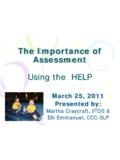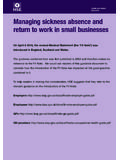Transcription of What is Domestic Violence? Myths & Realities
1 Domestic violence 101. What is Domestic violence ? Domestic violence is a pattern of abusive behaviors through the use of power and control tactics used by one person over another in an intimate relationship. Partners may be dating, married or not married; separated; heterosexual, gay, lesbian, living together or not living together. Such abusive behaviors can include pushing, shoving, slapping, throwing objects; choking, isolating you from your loved ones; being called names and threatening to hurt you. Domestic violence can happen to anyone, crossing all boundaries of culture, age, race, sex, education, and socioeconomic status. No one deserves to be abused, no matter what the circumstances. Myths & Realities Myth: Domestic violence does not happen very often. Reality: Battering is very common. It is one of the most underreported crimes. It is also the leading cause of injury to women. A woman is physically abused by their partner every 15. seconds in the United States.
2 Myth: Women who stay in abusive relationships are asking for it. Reality: It is a myth that survivors do not leave abusive relationships. Actually a survivor leaves an average of 6-8 times and each time she leaves, the violence can often escalate. Women who leave their abuser are at higher risk (75% greater risk) of being killed than those who stay. Either staying or leaving the abusive relationship poses risks to her safety. A survivor that stays in the relationship oftentimes is strategizing the best time and safest time to leave. Domestic violence can also cause women and children to become homeless. Myth: Alcohol/drugs cause battering. Reality: While there may be many cases of Domestic violence that involve the use of drugs/alcohol, it does NOT cause battering. The use of drugs/alcohol is often used as an excuse for the abuse. Many abusers do not use alcohol/drugs and there are many who abuse drugs/alcohol who are not abusive. Domestic violence is a choice and preventing someone to use alcohol/drugs will not necessarily stop the abuse.
3 Counseling for drugs or alcohol problems will not stop the problem of Domestic violence Myth: Abusers cannot change their behavior and will always abuse. Reality: Domestic violence is a learned behavior and can be unlearned if the abuser takes responsibility and accountability for the violence committed. People who abuse often have learned this behavior and it will take time to undo and learn new ways of solving problems or coping with stress. Myth: Many survivors feel they deserve the abuse. Reality: There are many survivors that feel this way, and they must know no one deserves to be abused and they are not alone. Oftentimes abusers can make survivors feel guilty for a lot of things and lower their self-esteem by being told negative things about them that is untrue. Domestic violence is a choice and batterers must be accountable for their actions. Myth: Children who grow up in abusive homes won't be affected, especially if they are still so young.
4 Reality: Children growing up witnessing the abuse may grow up learning that it is normal and may become batterers or victims in their adult relationships. Children may be abused or neglected while the mother deals with the trauma of the abuse. Many children who are exposed to the violence may also grow up blaming themselves for the abuse and for not being able to stop it. Statistics A woman in the United States is physically abused every 15 seconds 1 out of 4 women are beaten by their spouses or partners at some point in their lives 4,000 women are killed each year as a result of Domestic abuse; In Alameda County between 2001 and 2005, women comprised 72% of the victims in Domestic violence - related deaths (ACPHD, 2007). It is estimated that approximately 70% of men that abuse their partners also abuse their children Domestic violence is the leading cause of injury to women in the United States between the ages of 15-44 years old Domestic violence is often committed by a husband or boyfriend, about two-thirds of the attacks Intimate partner violence is primarily a crime against women.
5 In 2001, women accounted for 85 percent of the victims of intimate partner violence and men accounted for approximately 15 percent of the victims (Bureau of Justice). Domestic abuse is one of the most underreported crimes against women and nearly half of violent crimes against women are ever reported to the police One in 3 teens report knowing a friend who has been in a dating violence relationship . been hit, choked, kicked or physically hurt and threatened by their partner. One in 20 elderly people experience elder abuse yearly Domestic violence occurs in approximately 30% to 40% of gay, lesbian, bisexual, and transgender relationships, which is the same percentage of violence that occurs in heterosexual relationships. Why it May be Hard to Leave If you have been coping with abuse for a long time, it can be hard to finally stand up and leave. Here are some reasons why it may be difficult to leave: Fear of losing children. Your partner threatens to take the kids away if you leave Fear of harm.
6 You fear that if you do leave, the threats of physical harm will get worse (including threats to family members and children). Love. You love your partner and believe and hope things will get better Denial. You minimize the abuse and tell yourself things are really not that bad. Economic dependence. Lack of financial resources or few choices and support for living independently Fear of not being able to survive. You fear that the abuser will find you and might retaliate by harming you or the kids. Negative impact on children. You believe that children should be raised with two parents and not just one. Fear of being alone. You fear of being without a mate or partner; coping with children and/or life alone. You may also believe that no one else could want you (and your kids.). Loyalty. You made a commitment and feel responsible to keep the family together Shame/guilt. You fear of embarrassment and humiliation and fearful that someone will know Rescue complex.
7 You believe you can change your partner if you stay with him Low self-esteem. Your partner has convinced you that you deserve the abuse and if you leave, you would not find anyone that would love you. Immigration status. You may be threatened that you will be deported Disability. You have a disability that does not allow you to work and are financially dependent on your abuser for assistance. Fear of partner suicide. Your partner threatens to commit suicide if you leave Male privilege. If you partner is male, he may believe that men should control the household by enforcing the rules and constantly make demands of you for sex, food etc. Fear of unknown. You fear of change and fear of not knowing what to expect Substance abuse. You may use alcohol or drugs to cope with the abuse and numb the pain, and as a result you may tolerate the abuse even more so Religion. You believe you made a commitment to God to keep the family together Lack of support.
8 You feel pressure from family and friends to stay



